Those who sustain similar illnesses or injuries while serving their country should have access to the same benefits, regardless of the nature of their service and where and when they served.
Table of Contents
Contact Information
We encourage Veterans and other clients of Veterans Affairs Canada who are having difficulties with the Department to call the Office of the Veterans Ombudsman. We are there to provide information, referrals, and assistance resolving issues, and each file that we open provides valuable information that helps us identify trends and systemic issues.
Toll-free telephone line (calls within Canada):
877-330-4343
Collect call from outside Canada:
902-626-2919
Email: info@ombudsman-veterans.gc.ca
Address: P.O. Box 18, Station B, Ottawa, ON, K1P 6C3
Letter to the Minister of Veterans Affairs
The Honourable Steven Blaney, P.C., M.P.
Minister of Veterans Affairs
House of Commons
Ottawa, Ontario
K1A 0A6
Dear Minister:
I am pleased to submit to you the 2010–2011 Annual Report for the Office of the Veterans Ombudsman, One Veteran: A Matter of Fairness. The report provides an overview of our operations and activities from April 1, 2010, to March 31, 2011, as well as our priorities for the coming year.
Yours sincerely,
The paper copy
was signed by
Guy Parent
Veterans Ombudsman
Veterans Bill of Rights
The Veterans Bill of Rights applies to all clients of Veterans Affairs. They include:
- Veterans with war service
- Veterans and serving members of the Canadian Forces (Regular and Reserve)
- Members and former members of the Royal Canadian Mounted Police
- Spouses, common-law partners, survivors and primary caregivers
- Other eligible dependants and family members
- Other eligible clients
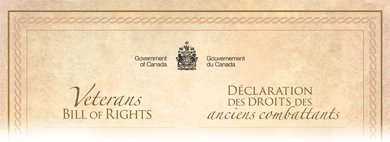
Veterans Bill of Rights
PDF
You have the right to:
- Be treated with respect, dignity, fairness and courtesy.
- Take part in discussions that involve you and your family.
- Have someone with you for support when you deal with Veterans Affairs.
- Receive clear, easy-to-understand information about our programs and services, in English or French, as set out in the Official Languages Act.
- Have your privacy protected as set out in the Privacy Act.
- Receive benefits and services as set out in our published service standards and to know your appeal rights.
You have the right to make a complaint and have the matter looked into if you feel that any of your rights have not been upheld.
The Right Honourable Stephen Harper, P.C., M.P.
Prime Minister of Canada
The Honourable Greg Thompson, P.C., M.P.
Message from the Veterans Ombudsman

Today, there is a clear expectation among Veterans, their families, and Veterans organizations that programs and services available to them will be updated over the next few years to meet both current and future needs. In recognition of their service and sacrifices, former members of the Canadian Forces and the RCMP expect a high standard of service from the Government of Canada and demand to be treated with respect.
Parliamentarians, and all Canadians, also firmly believe that Canada has the obligation to provide the very best support to the men and women who put their lives at risk defending our country and the values that we hold dear. This resolve to do right by Veterans is encouraging but must be translated into action.
In keeping with the Veterans Bill of Rights, I am committed to ensuring the fair treatment of Veterans, serving members of the Canadian Forces and the RCMP, as well as all other clients of Veterans Affairs Canada. Although the Government of Canada’s definition of a Veteran for recognition purposes applies to men and women who completed their basic training and were honourably released from the Canadian Forces, I also consider former members of the RCMP to be Veterans.
Fairness is both a value and a measurable outcome. As an outcome, I measure fairness in terms of adequacy (Are the right programs and services in place to meet the needs?), sufficiency (Are the right programs and services sufficiently resourced?), and accessibility (Are eligibility criteria creating unfair barriers, and can the benefits and services provided by Veterans Affairs Canada be accessed quickly and easily?).
In regard to eligibility criteria, I share the conviction of all Veterans organizations that access to benefits and services should be based on needs. The One Veteran theme that I have chosen to guide my interventions encapsulates that conviction: those with similar illnesses or injuries should have access to the same benefits, regardless of the nature of their service and where and when they served.
I believe that if parliamentarians considered the needs of ill and injured Veterans and still-serving members through a lens of fairness when making decisions about budget allocation, deficit reduction initiatives, and legislative amendments governing the provision of benefits and services, they could bring about meaningful change.
Likewise, senior officials of Veterans Affairs Canada could greatly improve access to benefits and services by simplifying policies, procedures, and processes, and by devolving decision-making to the lowest level possible.
On March 24, 2011, Bill C-55, the Enhanced New Veterans Charter Act, received final approval with a clause that guarantees a parliamentary review of the provisions of the New Veterans Charter. In addition, Veterans Affairs Canada is moving forward on its five-year transformation agenda. Both exercises provide opportunities to focus attention on the fair treatment of Veterans. There is much at stake here and my Office will participate actively on both fronts.
By virtue of my dual role as Veterans Ombudsman and special advisor to the Minister, and as the only federally mandated voice for Veterans, I am uniquely positioned to raise concerns about policies and processes that create difficulties for Veterans and other clients of Veterans Affairs Canada and to recommend improvements. In my discussions with the Minister, I can provide a Veteran’s perspective on issues that are brought to his attention by the Department and apprise him of developments that he might not otherwise hear about. I believe that by providing evidence-based advice to the Minister, he will be more effective in discussions about the fair treatment of Veterans with his Cabinet colleagues, other fellow parliamentarians, and senior officials of the Department.
Over the past four months, I have invested considerable time building relationships with senior officials of Veterans Affairs Canada, and I will continue to do so to ensure that my Office is in a position to intervene when we see unfairness in the system and to ensure that the needs of Veterans are considered throughout the decision-making process. Informing parliamentarians about the needs of ill and injured Veterans and still-serving members of the Canadian Forces and the RCMP will also remain a priority.
Reaching out to the Veterans community to explain my role and the services available through my Office and encouraging dialogue on issues of concern are extremely important to me. I have met with officials of many Veterans organizations, and I look forward to many more encounters with the men and women that I represent and on whose behalf I provide advice to the Minister of Veterans Affairs.
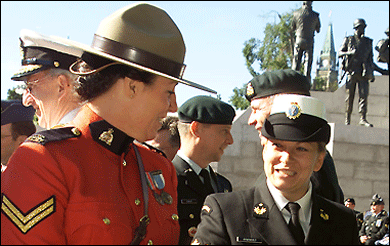
Fiscal year 2010–2011 was a transition year for the Office of the Veterans Ombudsman, and I would be remiss if I did not acknowledge the contributions of my predecessor, Colonel (Retired) Patrick Stogran. As Canada’s first Veterans Ombudsman, he faced the challenge of building the Office from the ground up, while at the same time responding to requests for assistance from Veterans. As Colonel Stogran’s former Director of Research and Investigations, I witnessed first-hand his firmness of purpose and his determination to affect change on behalf of Veterans, particularly the most vulnerable as demonstrated by his efforts to bring attention to the needs of homeless Veterans and Veterans suffering from amyotrophic lateral sclerosis (ALS). I would like to express my gratitude to Colonel Stogran for all that he has done to bring Veterans’ issues to the forefront.
It is now incumbent on me to keep up the momentum with the support of a team of professionals as dedicated as I am to the fair treatment of Veterans, still-serving members, and their families.
There is much at stake here. I believe that it was George Washington who said, "The willingness with which our young people are likely to serve in any war, no matter how justified, shall be directly proportional to how they perceive the Veterans of earlier wars were treated and appreciated by their nation." Ultimately, it could be argued that taking care of our ill and injured former and current members of the Canadian Forces and the RCMP is a matter of national security.
Guy Parent
Veterans Ombudsman
About the Office
The Swedish word "ombudsman" means "representative of the people." There are 760,000 Veterans in Canada and more than 100,000 still-serving members of the Canadian Forces and the RCMP who one day will join their ranks. Whether or not they receive services and benefits from Veterans Affairs Canada, I consider all of them and their families to be stakeholders of the Office.
Our mandate
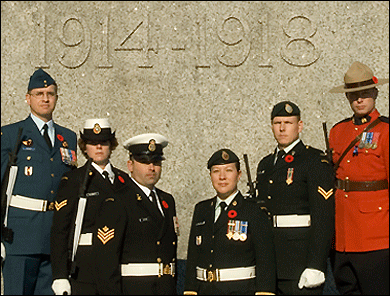
The Office of the Veterans Ombudsman works to ensure that Veterans, serving members of the Canadian Forces and the RCMP, and other clients of Veterans Affairs Canada are treated respectfully, in accordance with the Veterans Bill of Rights, and receive the services and benefits that they require in a fair, timely and efficient manner.
The Office addresses complaints, emerging and systemic issues related to programs and services provided or administered by the Department of Veterans Affairs, as well as systemic issues related to the Veterans Review and Appeal Board.
The Office plays an important role in broadening awareness of the needs of Veterans and of the contributions they continue to make to Canadian society when they return to civilian life.
Our approach
The Office functions in accordance with the standards of practice of the International Ombudsman Association, which are also endorsed by the Forum of Canadian Ombudsman, namely, independence, impartiality and neutrality, confidentiality and informality. These standards govern the way in which the Office receives complaints, works to resolve issues, and makes objective and evidence-based recommendations to the Minister and Veterans Affairs Canada.
The Office is committed to the fair treatment of Veterans and views fairness as an outcome that can be objectively measured in terms of the adequacy, sufficiency and accessibility of the benefits and services in place to address the needs of ill and injured Veterans and those still in uniform:
Adequacy: Are the right programs and services in place to meet the needs?
Sufficiency: Are the right programs and services sufficiently resourced?
Accessibility: Are eligibility criteria creating unfair barriers, and can the benefits and services provided by Veterans Affairs Canada be accessed quickly and easily?
In regard to eligibility criteria, the Office believes, as do all Veterans organizations, that access to benefits and services should be based on needs. The One Veteran theme encapsulates that conviction and is central to how accessibility issues are viewed by this Office: those with similar illnesses or injuries should have access to the same benefits, regardless of the nature of their service and where and when they served.
Who we serve
The Office stands ready to help members of the Veterans community, serving members of the Canadian Forces and the RCMP, and other clients of Veterans Affairs Canada:
- Veterans of the Second World War and the Korean War
- Veterans of the Canadian Forces (Regular Force and Reservists)
- Serving members of the Canadian Forces (Regular Force and Reservists)
- Veterans of the RCMP
- Members of the RCMP
- Immediate family members and caregivers of any of the above-mentioned groups
- Survivors of Veterans of the First World War
- Former members of the Canadian Forces who did not complete basic training, and who have service-related medical conditions.
Although the Government of Canada’s definition of a Veteran for recognition purposes applies to men and women who completed their basic training and were honourably released from the Canadian Forces, the Office considers former members of the RCMP to be Veterans.
Our services
The Office provides four main services:
Information— Frequently, those who call the Office are confused about the benefits, services and redress mechanisms available to them. The Office helps them navigate the complexity of the system by providing information about their rights and about the benefits and services provided by Veterans Affairs Canada and other organizations.
Referrals— The Office assists those who call for help, often as a last resort, by facilitating referrals to service providers that can best assist them.
Complaints— The Office addresses complaints from individuals who believe they have been treated unfairly by Veterans Affairs Canada or other service providers. To bring closure as quickly as possible, every attempt is made to resolve complaints informally and at the lowest level possible, most often through inquiries and mediation with service providers.
Interventions to address systemic issues—When the facts of a case raise systemic issues that can potentially affect many other Veterans and clients of the Department, when there are repeat complaints about the same issue, or when issues emerge as a result of the Office’s interaction with the Department and the Veterans community, the Office will intervene in one of three ways based on the complexity of the issue:
- Simple procedural issues are discussed informally with the Department to bring resolution as quickly as possible. A telephone call or an exchange of correspondence is often all that is required to affect a change.
- Complicated issues may require more formal interventions, such as observation papers that present the facts as the Office understands them as well as its concerns and questions. Observation papers enable Veterans Affairs Canada to take timely corrective action as needed and to offer information that will help the Office gain a better understanding of the situation.
- Complex issues may require thorough investigation, leading to a formal report with recommendations to the Minister. These reports are published 60 days after submission to the Minister.
Communications and outreach
Communications are central to the work of the Ombudsman to not only inform and educate but also to learn, encourage dialogue and affect change. The Office uses a variety of means to promote discussion with the Veterans community, to ensure that Veterans’ concerns are reflected in the work of the Office, and to engage parliamentarians and other decision-makers on Veterans’ issues.
Communications and outreach activities are carried out
- to enhance awareness and understanding of the Veterans Ombudsman’s role and mandate;
- to raise awareness among Veterans and other clients of Veterans Affairs Canada of the services provided by the Office;
- to increase understanding of Veterans’ issues and foster informed dialogue about them; and
- to promote and build support among legislators and senior officials of Veterans Affairs Canada for the Ombudsman’s recommendations to advance the issues of fairness.
It is also a communications priority to raise awareness of the valuable contributions that today’s Veterans and the more than 6,000 men and women who retire every year from the Canadian Forces and the RCMP continue to make to society when they return to civilian life.
Structure of the Office
The Ombudsman is supported by a team of 37 employees located in Ottawa and Charlottetown, including service representatives, early intervention and policy analysts, investigators, communicators, a legal advisor, a policy advisor, and administrative support staff. The team includes former members of the Canadian Forces and the RCMP, as well as experienced public servants, who use their knowledge and expertise to level the playing field by helping Veterans and other clients of Veterans Affairs Canada navigate the established processes.
The Ombudsman also relies on an Advisory Committee for advice on matters of concern to the Veterans community and to foster cooperation among Veterans’ groups and increased dialogue between the Veterans community and the Office.
Organizational chart
- Veterans Ombudsman
- Director general, Operations / Deputy Ombudsman
- Operations
- Communications and Outreach
- Early Intervention
- Research and Investigations
- Corporate Services and Charlottetown Operations
- Senior Advisor
- Operations
- Senior Counsel
- Director general, Operations / Deputy Ombudsman
The Year in Review: 2010–2011
2010–2011 might best be remembered as the year of Veterans’ discontent. For the first time in recent memory, Veterans’ issues came to the forefront of public attention, much to the credit of former Ombudsman Patrick Stogran who encouraged Veterans to speak out as he did. I believe that this very public expression of discontent was successful in making legislators and senior officials of Veterans Affairs Canada take note of Veterans’ concerns. Today, there is an expressed willingness on the part of the Department and the Government of Canada to improve programs and services—and my Office will strive to make that expression of intent a reality.
Individual cases
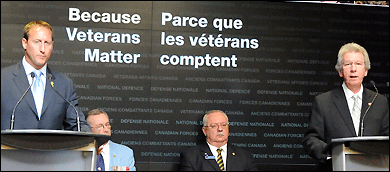
Throughout 2010–2011, the Office continued to provide assistance through early interventions. It received 9,500 calls, emails and letters—up from 7,700 the previous year.
In total, the Office opened 1,823 new cases and closed 2,099 cases, of which 390 cases still open from the previous year. On March 31, 2011, 114 cases were still in progress.
The top seven issues were related to the following:
Health care benefits (including limited access to treatment benefits, the cumbersome approval process, denial of benefits, turnaround times for reimbursement, interpretation of policies and regulations)
Disability pensions and awards (related to decision outcomes, including denials for lack of evidence, retroactivity, assessment and compensation levels)
Issues external to Veterans Affairs Canada (issues under provincial jurisdiction or pertaining to the Department of National Defence)
Veterans Independence Program (including eligibility criteria, turnaround times, level of financial support)
Veterans Review and Appeal Board (including decisions pertaining to disability benefits and process-related issues)
New Veterans Charter (including issues pertaining to the Rehabilitation Program, the Earnings Loss Benefit, the Death Benefit, the Permanent Impairment Allowance, and case management issues)
Long-term care (including access to contract beds for traditional Veterans and non-access to contract beds for Canadian Forces Veterans)
Top seven issues
(78 percent of all 1,823 cases)
| Issue | Number of cases |
|---|---|
| Health care benefits | 371 |
| Disability pensions and awards | 367 |
| External to Veterans Affairs Canada | 208 |
| Veterans Independence Program | 147 |
| Veterans Review and Appeal Board | 137 |
| New Veterans Charter (Excluding disability awards) | 124 |
| Long-term care | 67 |
Service profile
(1,431 individual clients)
As in past years, the majority of new cases were brought to the Office by former and serving members of the Canadian Forces (Regular and Reserve Forces) and by traditional Veterans (Veterans of the Second World War and the Korean War).
| Service Profile | Percentage of clients |
|---|---|
| Former members of the Canadian Forces (Regular Force) * | 39% |
| Serving members of the Canadian Forces (Regular Force) | 5% |
| Traditional Veterans ** | 15% |
| Former and serving members of the Reserve Force | 4% |
| Former and serving members of the RCMP | 3% |
| Survivors / family members | 14% |
| Civilians | 2% |
| Others | 18% |
| * Veterans who served after 1947 (excluding the Korean War) ** Veterans of the Second World War and the Korean War |
|
Geographic profile
(1,431 individual clients)
The largest number of cases originated in Ontario and the Western Region (Alberta and British Columbia), followed by the Atlantic Region and Quebec.
| Geographic location | Percentage of clients |
|---|---|
| Atlantic | 20% |
| Quebec | 14% |
| Ontario | 26% |
| Prairies | 5% |
| Alberta | 8% |
| British Columbia | 18% |
| Foreign/unknown | 9% |
Trends and issues identified through individual cases
It is by working on individual cases that the early intervention team identifies issues that can have an impact on the larger Veterans community. The Office engages Veterans Affairs Canada to resolve issues that create unfair barriers to accessibility or raise questions about the adequacy and sufficiency of the benefits and services provided by the Department. Below are a few examples of issues that are currently being pursued with the Department:
The most vulnerable Veterans are not informed about their eligibility for the Exceptional Incapacity Allowance
In addressing the complaint of a Veteran, the Office found that half of the 1,800 Veterans with a disability assessment of 98 percent or higher had never been informed that they may be eligible for the Exceptional Incapacity Allowance under the Pension Act. After the Office raised this issue, the Department corrected the situation by sending a letter to all those Veterans who had not applied for the Allowance.
When Veterans pass away, survivors are not informed about changes to their benefits
When a Veteran passes away, the survivor, in most cases the spouse or common-law partner, continues to receive the Veteran’s pension for one year. After that time, he or she receives a survivor’s pension, which can be substantially less, particularly if the Veteran was receiving a full pension as well as attendance and exceptional incapacity allowances. The Office is noticing that not all survivors are receiving advance written notice of the reduction of their pension benefits, which is creating confusion and financial hardship.
Requests for treatment and medication are denied but not explained
Letters sent to Veterans to inform them that their request for treatment benefits and medication is denied do not always explain how and why the decision was made. This makes it very difficult for Veterans to gather the necessary documents that might result in a successful appeal.
Process to request the extension of treatment benefits still causing difficulties
Under the Program of Choice 12, Veterans and other clients of Veterans Affairs Canada can obtain treatment benefits, such as massage therapy and physiotherapy. The Department introduced a new policy in January 2010 with the intent of providing greater flexibility and reducing red tape in the administration of the program, including the processing of requests for extension of treatment benefits. Since then, the Office has yet to see a reduction in the number of complaints. It would appear that the new policy is not being applied as intended and that many requests for extension are being denied based on the old policy.
No reimbursement of treatment expenses incurred while waiting for decisions on applications for disability awards
Under the Pension Act, a Veteran who submits an application for a disability pension and receives a favourable decision can be reimbursed for treatment expenses related to the pensioned condition, retroactive to 90 days prior to the date of application. No matter how long it takes the Department to process the application, the Veteran is not penalized financially. This is not the case for Veterans awaiting a decision on their applications for a disability award under the New Veterans Charter. They are reimbursed for treatment expenses that are incurred after the decision to grant a disability award is made but not for expenses incurred while the Department processes their application.
Disability award recipients are not eligible for the Treatment Allowance
Under the Veterans Health Care Regulations, Veterans receiving temporary acute care for a condition for which they have a disability pension are entitled to receive the Treatment Allowance in addition to their monthly pension. Veterans receiving a disability award are not eligible to receive additional compensation during a period of temporary acute care.
No attendant fees for spouses of Veterans in need of assistance to get to their medical appointments
Those who are in receipt of treatment benefits are eligible to receive supplementary benefits, such as the reimbursement of travel costs and the cost of an attendant to get to medical appointments. When a spouse accompanies a Veteran who requires help to get to a medical appointment, the Department will not authorize escort fees. However, the Department will reimburse these fees if the Veteran is escorted by someone who is not a member of his or her household.
Light therapy for depression
After the Office inquired into the case of a Veteran who for three years was denied light therapy treatment for post-traumatic stress disorder, the Department reviewed the evidence supporting the benefits of this form of therapy and agreed to add light therapy to its benefit grid. This grid is the Department’s tool to determine which treatment benefits will be authorized and under what conditions.
Hedge trimming expenses denied under the Veterans Independence Program
Under the Veterans Independence Program, the Department provides financial assistance for housekeeping and grounds maintenance services. However, in discussions with the Department about the concerns of a Veteran who had called the Office for assistance, the Office found that expenses for hedge trimming were only reimbursed under the Program if there was a safety issue. The Office challenged the Department on this issue, and as a result of this intervention the Department is currently reviewing the policy to include hedge trimming as a normal expense. The new policy should be released in fall 2011.
Interventions on major files
While resolution of individual cases is an important activity for the Office, considerable effort was made on issues of great importance to the Veterans community and other clients of Veterans Affairs Canada.
Agent Orange
The Office looked into a number of issues associated with the tax-free $20,000 Agent Orange ex gratia payment. In July 2010, the Office submitted an observation paper to the Department on the issue of using more recent updates of health conditions associated with Agent Orange exposure. These updates are prepared by the U.S. Institute of Medicine (IOM), a non-governmental, internationally recognized organization of medical professionals, researchers and scientists.
While the Department recognizes on its Web site that "the IOM is widely considered to be the definitive source for medical information related to Agent Orange," and used the health conditions identified in the 2004 IOM update as one of the eligibility criteria for the ex gratia payment, it has yet to recognize the additional health conditions listed in the 2006 and 2008 IOM updates.
The Office also raised concerns about the October 1, 2010 deadline for submitting applications and the eligibility requirement for applicants to have been alive on February 6, 2006. On December 22, 2010, the Minister of Veterans Affairs announced that the application deadline had been extended to June 2011 and that the requirement for applicants to have been alive on February 6, 2006, was removed. The change made it possible for individuals to apply on behalf of a Veteran who died before the ex gratia payment came into force.
ALS (Amyotrophic Lateral Sclerosis)
Although studies done in the United States found that service men and women were much more likely to contract ALS than civilians, Veterans Affairs Canada did not recognize the link between military service and ALS.
Mr. Brian Dyck, who served in the Canadian Forces, was diagnosed with ALS in October 2009. The Office was approached to assist the Dyck family with their plight to access health care and benefits. In August 2010, Mr. Dyck appeared at a news conference with the former Veterans Ombudsman and other Veterans to express their frustration at securing benefits. In September, Prime Minister Stephen Harper pledged to provide help to Veterans afflicted with ALS. Thankfully, Mr. Dyck lived to see this victory and although he lost his battle with ALS on October 8, 2010, his legacy lives on. On October 15, 2010, the Minister of Veterans Affairs announced measures to ensure that Veterans with ALS quickly obtain the help and support that they need.
First amendments to the New Veterans Charter
Veterans Ombudsman Guy Parent supported Bill C-55, An Act to amend the Canadian Forces Members and Veterans Re-establishment and Compensation Act, as the Act introduced measures to improve benefits for permanently and severely injured Veterans and was a first step in the long-awaited process of making improvements to the New Veterans Charter.
In February 2009, the Office submitted an observation paper to the Department pointing out that by not combining disability assessments under both the Pension Act, and the New Veterans Charter, the most severely disabled Veterans with disability benefits under both Acts were prevented from accessing the Exceptional Incapacity Allowance or the Permanent Impairment Allowance. Bill C-55 proposed measures to correct this technical error, introduced payment options for the disability award, and established a monthly $1,000 supplement for permanently and severely injured Veterans.
In the Ombudsman’s remarks to members of the House of Commons Standing Committee on Veterans Affairs on March 7, 2011, he emphasized the need for additional improvements, indicating that "waiting another five years to bring about further improvements to the New Veterans Charter would be unacceptable." The Committee proposed the inclusion of a review clause to the Bill.
On March 24, 2011, Bill C-55 received final approval, and it includes a clause that guarantees a parliamentary review of the provisions of the New Veterans Charter.
Publishing of decisions rendered by the Veterans Review and Appeal Board
The Office has encouraged the Board to publish its decisions on its Web site, in keeping with guidance provided by the Privacy Commissioner of Canada in relation to administrative tribunals. Tribunals such as the Pension Appeals Board and provincial workers compensation boards are able to reconcile the objectives of open government and the protection of individuals’ privacy. The Office believes that publishing decisions would increase transparency and enable Veterans who are preparing appeals to be aware of decisions rendered in cases similar to their own.
In correspondence between the Office and the Veterans Review and Appeal Board, the Board explained that in 2009 it considered the impact of removing personal information from its decisions (more than 4,500 decisions in 2010–2011) and posting decisions on its Web site. The Board found that there are significant costs and effort associated with removing personal information and translating decisions, as well as with implementing and maintaining a user-friendly system for online publishing. The Board further indicated that it is undertaking a "further review to determine whether options other than posting all of its decisions would equally serve the public interest while improving transparency." As a result of this additional review, the Board has informed the Office that decisions containing "a question of law of general public interest or importance" will be published on its Web site in both official languages starting in 2012.
The Office will pursue the issue with the Board to obtain clarification on the criteria used to determine which decisions contain "a question of law of general public interest or importance" and how far back in the past the Board will go to identify decisions for posting.
Pro bono legal services for Veterans
The Bureau of Pensions Advocates is a nationwide organization of lawyers within Veterans Affairs Canada that provides free legal assistance to individuals who are not satisfied with decisions rendered by the Department on their claims for disability benefits. Legal representation by the Bureau, however, is restricted to representation before the Veterans Review and Appeal Board. The Bureau is not mandated to provide legal assistance to Veterans seeking a judicial review of a decision rendered by the Board in the Federal Court. This leaves Veterans to either retain private legal counsel at their own expense or represent themselves.
In September 2010, a private law firm communicated with the Office and offered pro bono services to assist Veterans in the Federal Court. The Office has since referred a number of cases to this law firm. All clients represented by the firm in the Federal Court were successful in having their cases returned to the Veterans Review and Appeal Board for a new hearing.
In November 2010, the Office communicated with all of the law societies in the provinces and territories to request assistance in identifying other law firms willing to help Veterans.
Responses from Ontario, Quebec and Manitoba have been favourable, and other provincial bar associations have communicated with the Office seeking further information.
Investigations
The Office has completed an investigation into the Veterans Independence Program and is in the process of finalizing its report. Our analysis has revealed that eligibility criteria and issues pertaining to access are of greatest concern. The report will focus on these areas.
The Office also initiated an investigation into the Department’s adjudication process to determine possible areas of concern and will publish the report in the next fiscal year.
Veterans Ombudsman Commendations
The Veterans Ombudsman’s Commendations are awarded annually to individuals and groups who, through their tireless efforts and determination, bring issues to light and lay the groundwork for positive and lasting change for the Veterans community.
Former Veterans Ombudsman Patrick Stogran honoured the following individuals with the first-ever awarded Commendations:
- Mr. Cliff Chadderton
- Mrs. Natali Dyck and her daughter Sophi
- Mr. John Labelle
- Mr. Harold Leduc
- Mr. Dennis Manuge
- Mr. Peter Stoffer, Member of Parliament for Sackville—Eastern Shore
A few case stories
A caregiver in need of care!
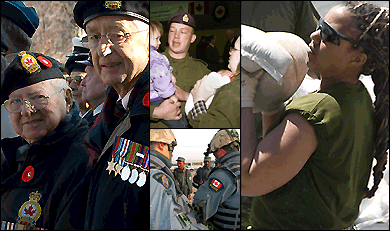
A caregiver who was receiving a disability pension from the Ontario Disability Support Program took in a Veteran in 1985. As part of the room and board agreement, she provided laundry once a week, meals and clean linen.
This arrangement was in place from 1985 to 2000 and no rate increase was ever made. Initially, the Veteran was able to perform regular daily activities despite having a few health issues. As his health deteriorated, the caregiver's role increased considerably and Veterans Affairs Canada approved housekeeping and grounds maintenance services under the Veterans Independence Program. The Veteran passed away and in 2004, the caregiver applied for Program benefits. Her application was denied on the grounds that she was an employee remunerated for her services and therefore did not qualify as a primary caregiver. She appealed the decision seven times and was denied each time.
The Office contacted the Employment Standards and Benefits Program to discuss the case, and it was informed that room and board arrangements cannot be misconstrued as wages or remuneration. She therefore could not be considered as an employee. As a result, the Department reviewed its decision and agreed to provide financial support under the Veterans Independence Program, retroactive to her initial request in 2004.
A call for assistance worth $13,000!
A serving member of the Canadian Forces was having difficulty obtaining payment following the favourable decision he received on his application for a disability award. After trying to sort things out with the Department for several months, he contacted the Office for assistance. It turns out that the Department was withholding payment pending the resolution of an overpayment issue. While the overpayment issue was resolved in favour of the client, the Department had neglected to process his disability award payment.
After verification, the Department promptly processed the disability award and the serving member received a $13,000 cheque within nine days.
The shortest route to a destination is not always the safest one
For years, an 82-year-old Veteran took the same route to his medical appointments and was reimbursed by the Department, without difficulty, based on his odometer reading. That changed when the Department began to reimburse his travel based on the shortest distance from his home to his appointments, using Google Maps for calculation purposes.
Although the Veteran wrote to the Department to explain that he felt safe using his regular route, nothing changed. Using Google Maps, an early intervention analyst from the Office noted that the shortest route required the Veteran to merge in and out of a three-lane highway. The Office intervened on behalf of the Veteran and pointed out that the Health Related Travel Guidelines are not so strict as to prevent employees from calculating reimbursable mileage through means other than online calculators. Travel is to be by the most convenient and economical means. The Department agreed and reimbursed the Veteran for the full mileage.
Medication—why get it for free when you can pay $125 per month for it!
A Veteran on a limited budget paid $125 per month for a type of insulin not on the Department's drug formulary. Although the Veteran provided a note from his doctor indicating that he had adverse reactions to other types of insulin that could be reimbursed by Veterans Affairs Canada, the Department refused the Veteran's requests for reimbursement. The Office asked why a Veteran on a limited budget would choose to pay out of pocket for insulin medication if he could get it for free from Veterans Affairs Canada. The Department considered the issue and agreed to cover the cost of the Veteran's medication, dating back 18 months when he first applied.
Patience is a virtue, but waiting 14 years is a bit much!
A Veteran pensioned for hearing loss approached the Office in July 2010 because he could not get reimbursed by Veterans Affairs Canada for the monthly use of a teletypewriter (an electronic device for text communication via a telephone line).
While the Department paid the cost of the teletypewriter and its installation in 1992, it refused to reimburse the monthly charge when the Veteran first made the request in 1996. The Office reviewed his file and found that over the years he had requested reimbursement in writing and orally on numerous occasions but his requests were turned down or ignored.
Since he had never appealed the Department's decisions, the Office informed him of his rights and advised him to appeal. He did so and was successful in getting reimbursed for the monthly charges going back 18 months. The Office again advised him to go to the second level of appeal and contacted the Department to point out that the Veteran had first asked to be reimbursed in 1996, and had done so on numerous other occasions after that. The Department reviewed the file and agreed to reimburse all monthly charges going back to December 1996.
Looking Ahead: 2011-2012
There will be many opportunities to advance issues of importance to the Veterans community in the coming years, including the parliamentary review of the New Veterans Charter and the Department's transformation agenda. I want to ensure that those who will be making decisions on behalf of Veterans do so through a lens of fairness. My Office will also be on the lookout for any cost reduction initiatives that may be at odds with the objective of improving programs and services in terms of adequacy, sufficiency and accessibility.
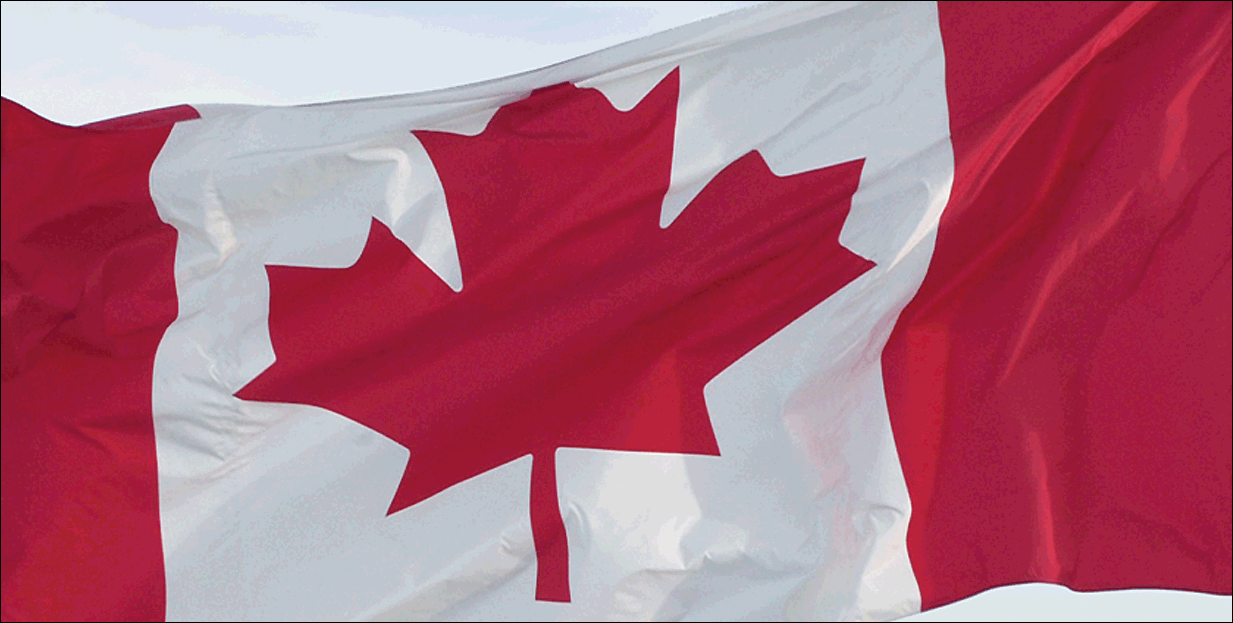
Transformation agenda
The Office of the Veterans Ombudsman will very closely follow the Department's efforts to improve service delivery and better meet the changing needs of the Veteran population, and will support changes that result in improvements to programs and services in terms of adequacy, sufficiency and accessibility.
A number of issues pertaining to the transformation agenda will be pursued with Veterans Affairs Canada in the coming year.
Assumptions about the Department's client base
The Department's transformation is partly based on a projected decrease in its client base from 210,000 today to 156,000 in 2020.
From the 90s onward, there has been a significant increase in the number of Canadian Forces operations over previous decades and a decrease in the size of the Canadian Forces. This has put added stress on individual members who have had to do multiple tours in higher intensity operations, as evidenced by the significant increase in the number of medical releases over the past 20 years.
The Office contends that the complexity of modern cases might be enough to increase the Department's workload even if there was a decline in the number of clients. Reducing resource allocation prematurely in anticipation of a projected decline in workload that may not happen could compromise the success of the renewal efforts to the detriment of Veterans and other clients of the Department.
Profile of Veterans and clients of Veterans Affairs Canada (2010)
| Profile of Veterans in Canada | Number | |
|---|---|---|
| Canadian Forces (Regular and Reserve Forces) | ||
| Still serving members | 91,300 | |
| Veterans | 593,700 | |
| Second World War and the Korean War | Veterans | 155,700 |
| RCMP | ||
| Still serving members | 22,161 | |
| Veterans | 13,371 | |
| Sources: 2008-2009 RCMP Pension Plan Report, Canadian Forces data from Wikipedia. | ||
| Profile of clients of Veterans Affairs Canada | Number |
|---|---|
| Canadian Forces (Regular and Reserve Forces) | 66,554 |
| Second World War and the Korean War | 64,966 |
| RCMP | 8,738 |
| Survivors | 78,183 |
| Source: Veterans Affairs Canada statistics. | |
Improved communications with Veterans and other clients of the Department
Under the current regime, the onus is on Veterans to self-identify and make their needs known to Veterans Affairs Canada. There are currently just over 760,000 Veterans and 110,000 serving members of the Canadian Forces and the RCMP in Canada; of them 140,000 receive benefits and services from the Department. There are more than 600,000 Veterans who are not clients of the Department and who may not be aware of the programs and services available to them.
Since individuals must contact Veterans Affairs Canada about their needs, the Department must implement a proactive communications and outreach program targeted to its current clients and to the broader Veterans community. The Office is of the view that improving communications and outreach must be an important element of the transformation agenda. A sustained, proactive outreach campaign would very likely increase demand for the Department's programs and result in a larger-than-projected client base.
Access to departmental benefits and services is governed by complex policies and eligibility criteria, making it very difficult for Veterans and other clients of Veterans Affairs Canada to understand what is available. For this reason, many feel vulnerable and ill-prepared to discuss their needs with the Department.
The Office has created an interactive visual tool called the Benefits Navigator that provides a visual representation of the benefits to which an individual may be eligible based on his or her own circumstances. The Navigator also makes it possible to access all the necessary information in one location. The Office will encourage the Department to adopt this tool and make it available to Veterans and other clients of the Department.
Application process for disability benefits
The published service standard for individuals to receive a decision from Veterans Affairs Canada on first application for disability benefits is 16 weeks, down from 24 weeks. The reduction in the number of weeks was achieved through a variety of initiatives, such as hiring additional employees, reducing workload in field offices and at headquarters, changing work processes and modernizing technology. The reduction was also achieved by "starting the clock" only when the Department has received all the necessary information from applicants. At this time, it is difficult to determine how much of the reduction in the number of weeks is attributable to improvements in the processing of applications rather than the result of when the Department starts to count the weeks.
To determine the appropriateness of this service standard, it is important to consider the application and appeal process from beginning to end. For an application to be successful, proof of service, a medical diagnosis, and proof that the medical condition was caused or aggravated by the applicant's service must be established. Unless the evidence is available in the applicant's service records, the legislation places the responsibility on the applicant to provide the evidence.
The time required by the applicant to gather the evidence is not reflected in the service standard of the Department nor is it reflected in the 21-week service standard of the Bureau of Pensions Advocates to prepare a case for appeal to the Veterans Review and Appeal Board.
The service standards of the Department and the Bureau of Pensions Advocates total 37 weeks. For an applicant who receives a negative decision from the Department and appeals the decision to the Board, which has a published service standard of 6 weeks from the date of the hearing, it can take well over a year to go through the application and appeal process.
When one considers the complexity and the time it can take to progress through the application and appeal process, the Office believes that the cumulative effect of all of the service standards is not acceptable.
Two-year review of the New Veterans Charter
Veterans Ombudsman Guy Parent supported Bill C-55, An Act to amend the Canadian Forces Members and Veterans Re-establishment and Compensation Act, as the Act introduced measures to improve benefits for permanently and severely injured Veterans and was a first step in the long-awaited process of making improvements to the New Veterans Charter. Bill C-55 corrected a technical flaw that prevented Veterans with disability benefits under both Acts from accessing the Exceptional Incapacity Allowance or the Permanent Impairment Allowance, introduced a monthly $1,000 supplement for permanently and severely injured Veterans, and introduced payment options for the disability award.
In the Ombudsman's remarks to members of the House of Commons Standing Committee on Veterans Affairs on March 7, 2011, he emphasized the need for additional improvements, pointing out that "the discussion about improvements to the disability award and financial benefits must continue," and suggesting that the next series of amendments could be on the Charter's dual compensation approach.
The Office will follow up on the Ombudsman's remarks by updating the actuarial study carried out by the Office in 2009 to compare the benefits available to Veterans before and after the introduction of the New Veterans Charter. This follow-up review, to be completed in the fall of 2011, will look at the impact of the benefits accruing to Veterans as a result of the passage of Bill C-55 and the changes to the Earnings Loss Benefit. The findings will be broadly disseminated to inform discussion about the sufficiency of the benefits available to current and former members of the Canadian Forces.
Regulatory process for Bill C-55 and changes to the Earnings Loss Benefit
The Office will closely follow the regulatory process to ensure that it is completed in a timely manner and that the regulatory changes proposed by Veterans Affairs Canada have the desired effect for Veterans and their families.
The Veterans Ombudsman supports the improvements to the Earnings Loss Benefit but deplores the fact that part-time reservists are treated differently. He will continue to raise the issue of differential treatment of reservists as unfair. It is an example of Veterans not having access to the same benefits by virtue of the nature of their service and when and where they served.
The Earnings Loss Benefit provides monthly financial assistance of up to 75 percent of pre-release salary to replace lost income for Veterans who are undergoing rehabilitation or who cannot return to work.
Although the minimum pre-tax income for injured Veterans of the Regular Force and full-time reservists will be increased to $40,000 a year, the minimum pre-tax income for injured part-time reservists will be only $24,300. This lower amount fails to recognize that injured part-time reservists have the same financial needs as others during their rehabilitation and that they may have lost the ability to return to well-paid civilian jobs or to educational pursuits, or to be gainfully employed in the future.
Systemic investigations
The Office will complete the investigations into the Veterans Independence Program and the Department's adjudication process, and it will continue to advocate for changes to the Funeral and Burial Program in line with the recommendations contained in its 2009 report Serve with Honour, Depart with Dignity. The Office is particularly concerned that the maximum amount of $3,600 provided by the Department for funeral and burial-related services is not in line with the average cost of a funeral in Canada, which is between $7,000 and $10,000.
In addition the Office will undertake the following investigations:
Agent Orange
The Office will conduct a systemic investigation of decisions made by the Veterans Review and Appeal Board in relation to claims for disability benefits linked to exposure to the Agent Orange herbicide. The investigation is prompted by the number of complaints received by the Office and the seemingly large number of unfavourable decisions on claims and appeals.
All Board decisions will be reviewed to fully identify trends based on the consistency of the rationale for decisions, the tabulation of granted versus denied claims, and of particular interest, the interpretation of the Human Health Risk Assessment Task 3A-1 (the Furlong Report) in rendering decisions. In 2006, the Department of National Defence initiated what is commonly referred to as the Furlong Report, which evaluated the impact of the spraying of Agent Orange on Canadian Forces personnel in Canadian Forces Base Gagetown in 1966 and 1967.
The report will be published 60 days after submission to the Minister of Veterans Affairs.
Decisions of the Veterans Review and Appeal Board reviewed by the Federal Court
The Office will conduct a systemic investigation of decisions rendered by the Veterans Review and Appeal Board that have been the subject of a judicial review in the Federal Court. The review of the Board's decisions will be carried out by a law firm and will include an analysis of the consistency of decisions, an assessment of the evidence, and the identification of legal trends. The review will also identify systemic issues that have a negative impact on Veterans. The final report with recommendations will be published 60 days after submission to the Minister of Veterans Affairs.
Families
There is limited knowledge and understanding of the benefits and services that are in place for families. The investigation will cover the following elements: definition of family, availability and awareness of benefits and services in place, eligibility and access issues, as well as a comparison of benefits before and after the introduction of the New Veterans Charter. This will be the first step towards creating a common knowledge base to focus debate on family needs.
Mental health
The high operational tempo of the Canadian Forces over the last two decades has put members of the Canadian Forces and their families under considerable stress. The cumulative mental health effects of these operations have yet to become fully evident. To ensure that current and future needs are met, the Office will initially look at the application process and issues related to program delivery, accessibility and outreach.
Long-term care
As the needs of Canada's aging Veterans of the Second World War and the Korean War become more critical, long-term care is increasingly becoming a topic of concern. In the first phase of this systemic investigation, the Office will examine issues related to eligibility, access and the application process. This will provide a common knowledge base to allow for a more fulsome discussion as Veterans Affairs Canada develops its long-term care strategy.
Communications and outreach
The Office will continue to use a variety of means to encourage dialogue with the Veterans community. The Ombudsman will participate in various outreach activities in the coming year to remain close to those he represents and to better understand the various points of view in the Veterans community. Efforts will also be made to improve the use of social media as a means to inform Veterans across the country and gather feedback from them in real time.
Engaging parliamentarians and other decision-makers on Veterans' issues will remain a priority. The Office will encourage discussion about the programs and services provided by Veterans Affairs Canada in terms of their adequacy, sufficiency and accessibility.
The Office will also promote the idea that benefits for Veterans should be considered a national security issue and be more closely aligned with the National Defence portfolio. For the Canadian Forces to effectively recruit, employ, and deploy, service personnel must have complete faith that their needs will be met while they serve and afterward. When decision-makers step up the operational tempo of the Canadian Forces and place service personnel in harm's way, they should also factor into their calculations the requirements to respond to the needs of the Veterans of tomorrow.
It is also a communications priority for the Ombudsman to raise awareness of the valuable contributions that today's Veterans and the more than 6,000 men and women who retire every year from the Canadian Forces and the RCMP continue to make to Canadian society when they return to civilian life. The Ombudsman will reach out to organizations that can make a significant contribution to the well-being of Veterans and their families, such as the Federation of Canadian Municipalities and the Forum of Canadian Ombudsman.
Corporate Priorities
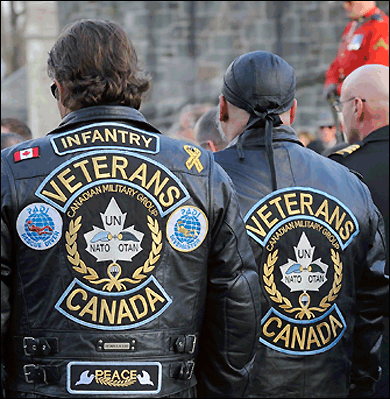
A number of initiatives will be undertaken over the next fiscal year to enhance the services and support the Office provides to the Veterans community and other clients of Veterans Affairs Canada.
The Office will improve organizational effectiveness and efficiency by strengthening its governance structure as well as its management and operational processes; by focusing on the recruitment, retention and development of qualified employees; and by implementing a new call centre solution.
In addition, the Veterans Ombudsman Advisory Committee will be restructured to support a new approach, and to ensure that a broad range of views and experiences are reflected on the Committee. The Committee will play an important role in helping the Office select issues for systemic reviews and assess the impact of changes proposed by Veterans Affairs Canada to programs and services.
Appendix—Financial Report
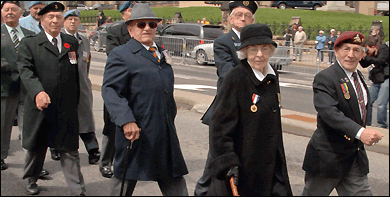
The Veterans Ombudsman was granted a budget of $6.6 million for fiscal year 2010–2011 that was approved by the Treasury Board through the Minister of Veterans Affairs, of which $4.1 million was allocated to program and operational costs.
2010–2011 Treasury Board Funding
| Organization | Salary ($000) |
Operating ($000) |
Total Funding ($000) |
|---|---|---|---|
| Office of the Veterans Ombudsman | 2,585.0 | 1,507.5 | 4,092.5 |
| Public Works and Government Services Canada (accommodations) | 449.5 | - | 449.5 |
| Treasury Board (employee benefits) | 765.3 | - | 765.3 |
| Veterans Affairs Canada (provision of services to the Office) | 1,241.6 | 100.2 | 1,341.8 |
| Totals | 5,041.4 | 1,607.7 | 6,649.1 |
2010–2011 Office of the Veterans Ombudsman (OVO), Program and Operational Expenditures
| Program and Operational Requirements | Expenditures ($000) |
|---|---|
| Communications, advertising and outreach | 63.7 |
| Travel | 252.2 |
| Professional and special services | 390.1 |
| Salaries and wages | 2,591.4 |
| Training and professional development | 32.7 |
| Telecommunications and transportation | 67.2 |
| Equipment, supplies, repairs and maintenance | 143.9 |
| Printing and publishing | 9.0 |
| Rentals | 7.4 |
| Miscellaneous | 1.8 |
| Total | 3,559.5 |
2010–2011 Veterans Affairs Canada, Program and Operational Expenditures for the Provision of Services to the OVO
| Program and Operational Requirements | Expenditures ($000) |
|---|---|
| Communications, advertising and outreach | - |
| Travel | - |
| Professional and special services | - |
| Salaries and wages | 1,241.6 |
| Training and professional development | - |
| Telecommunications and transportation | 32.4 |
| Equipment, supplies, repairs and maintenance | 67.7 |
| Printing and publishing | - |
| Rentals | - |
| Miscellaneous | - |
| Total | 1,341.7 |
2010–2011 Summary of Expenditures
| Organization | Expenditures ($000) |
|---|---|
| Office of the Veterans Ombudsman | 3,559.5 |
| Veterans Affairs Canada (provision of services) | 1,341.7 |
| Public Works and Government Services Canada (accommodations) | 449.5 |
| Treasury Board (employee benefits) | 765.3 |
| Totals | 6,116.0 |
Canada's Veterans

When they retire from the Canadian Forces and the RCMP, Veterans become invisible in a crowd, but their commitment to Canadian values remains strong. They put down roots in cities, towns, villages and hamlets across the country and utilize their skills and leadership qualities in diverse fields, such as volunteering, coaching, teaching, serving the public and as entrepreneurs. All communities are stronger and enriched in spirit because of the ongoing commitment of its Veterans.
Photo Credits
Photograph of Guy Parent, Veterans Ombudsman, Metropolis Studio
All other photographs except for the crowd image, Department of National Defence
